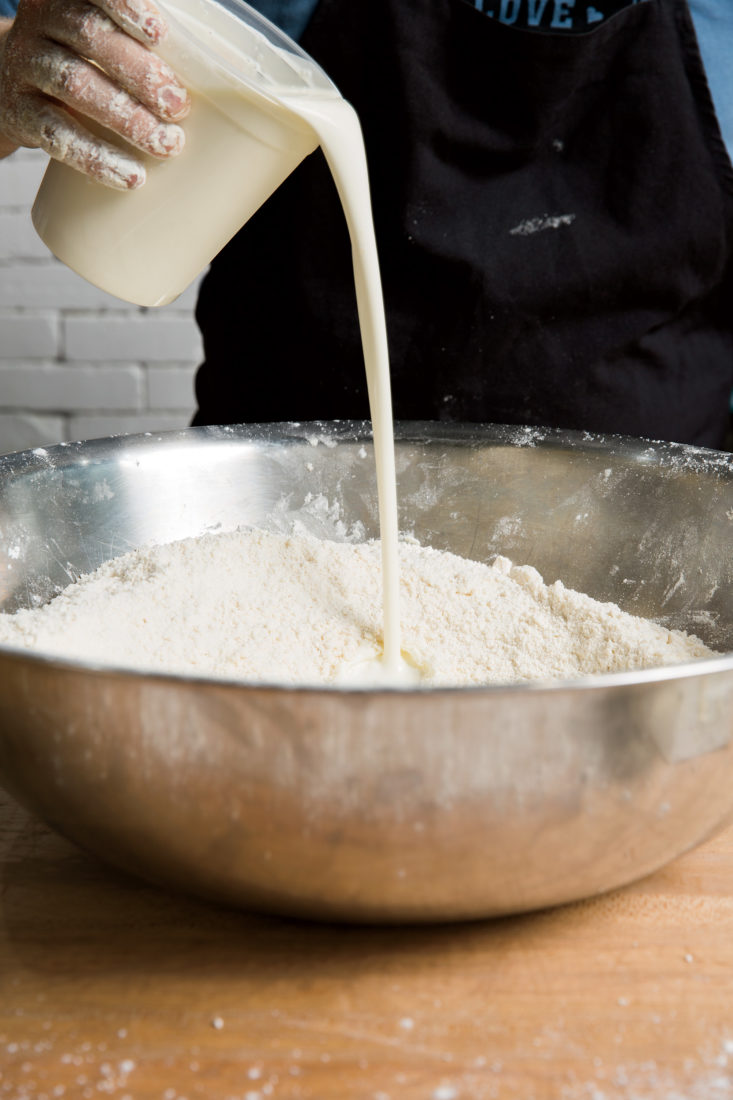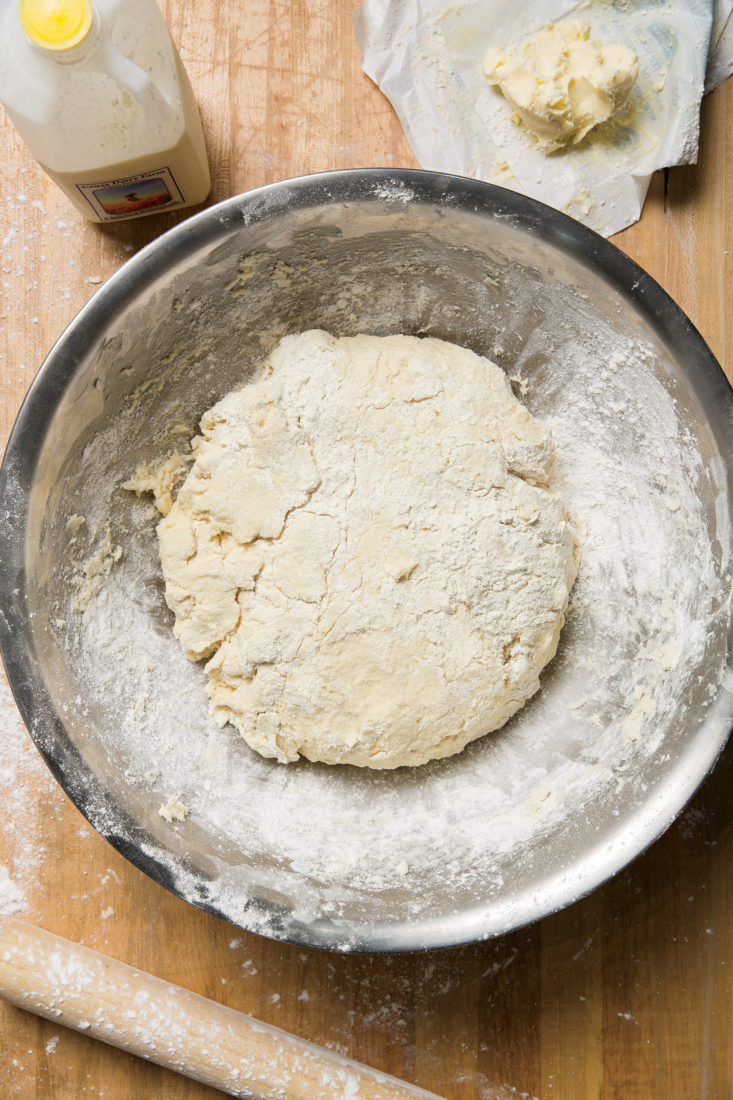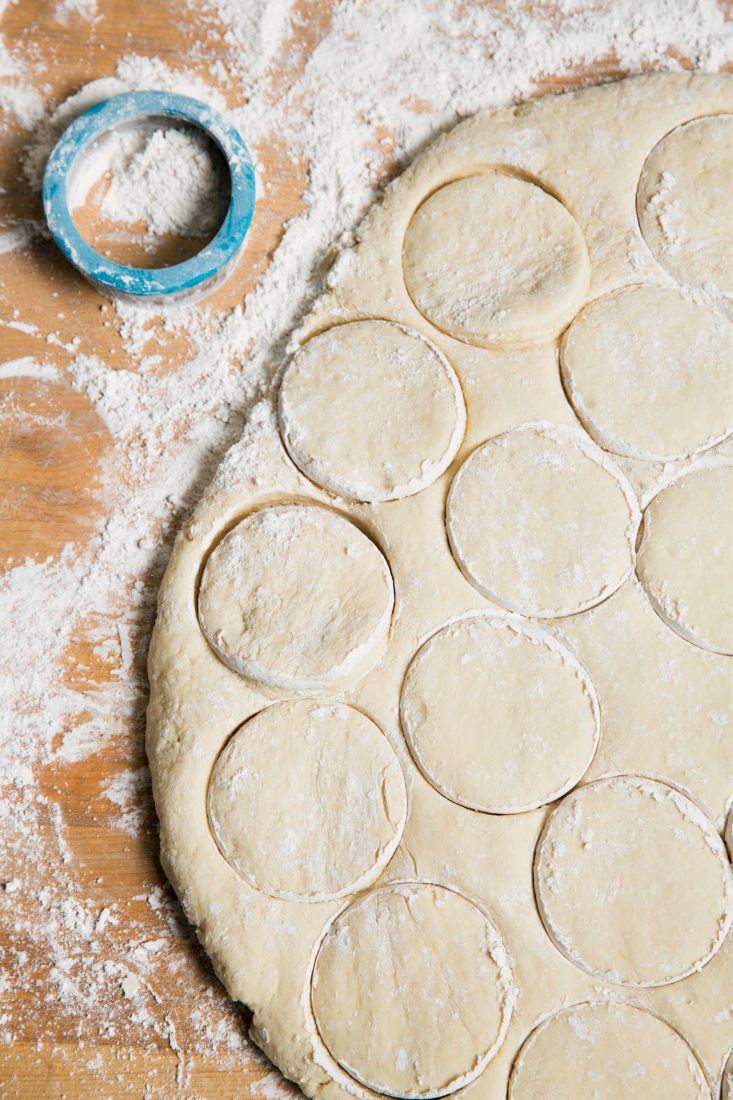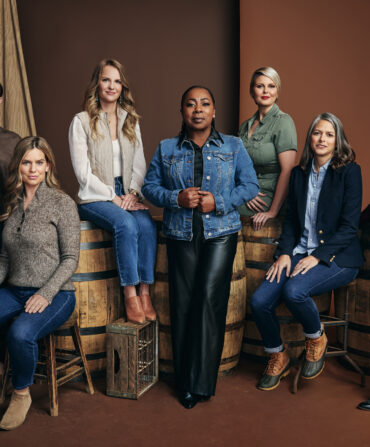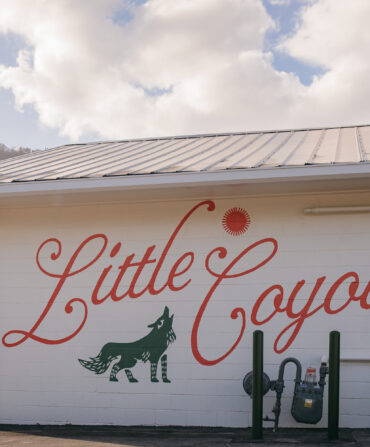Food & Drink
The Biscuit King
The buttery beauties at Karl Worley’s Nashville restaurant, Biscuit Love, inspire hour-long waits. But beyond the family recipes lies something even more impressive: a heartwarming rise

Photo: Photo by Luis Garcia; Lettering by Danielle Evans.
It is 6:45 a.m. and the Tennessee-born chef Karl Worley is drilling a screw into the wall, much to the chagrin of his eager prep staff. Worley, who is thirty-eight, along with his wife, Sarah, thirty-six, is the owner of Biscuit Love, a revered Nashville breakfast and lunch joint that since its 2015 opening has drawn hour-long lines on weekdays, due in part to the attention to detail currently on display.
“You about done?” one of the kitchen staff teases, snapping an apron at Worley as he tests the strength of his repaired shelf. Worley nods and smiles, then ducks into the narrow pass-through cooler, where he says good morning to the cooks gathering supplies before popping out the other side behind the bar. The tight setup was designed by the owners of the building’s original occupant: Kocktails & Kouture, a combination nightclub and retail shop, which was, surprisingly, not owned by the Kardashians. “It was black walls and spray-painted chandeliers,” Worley recalls of the space that would become the airy, bright brick-and-mortar iteration of what began with his and his wife’s thriving food truck.
Worley walks toward a table in the back of the restaurant, wrinkling his nose as he goes. “I still hate these tiles,” he says, jabbing a finger toward the beige floor, one of the few decorative vestiges of Kocktails & Kouture. “We were trying to save money. But every time I see them, I wish we’d ripped ’em the hell up.”
He sighs.
“Next time.”
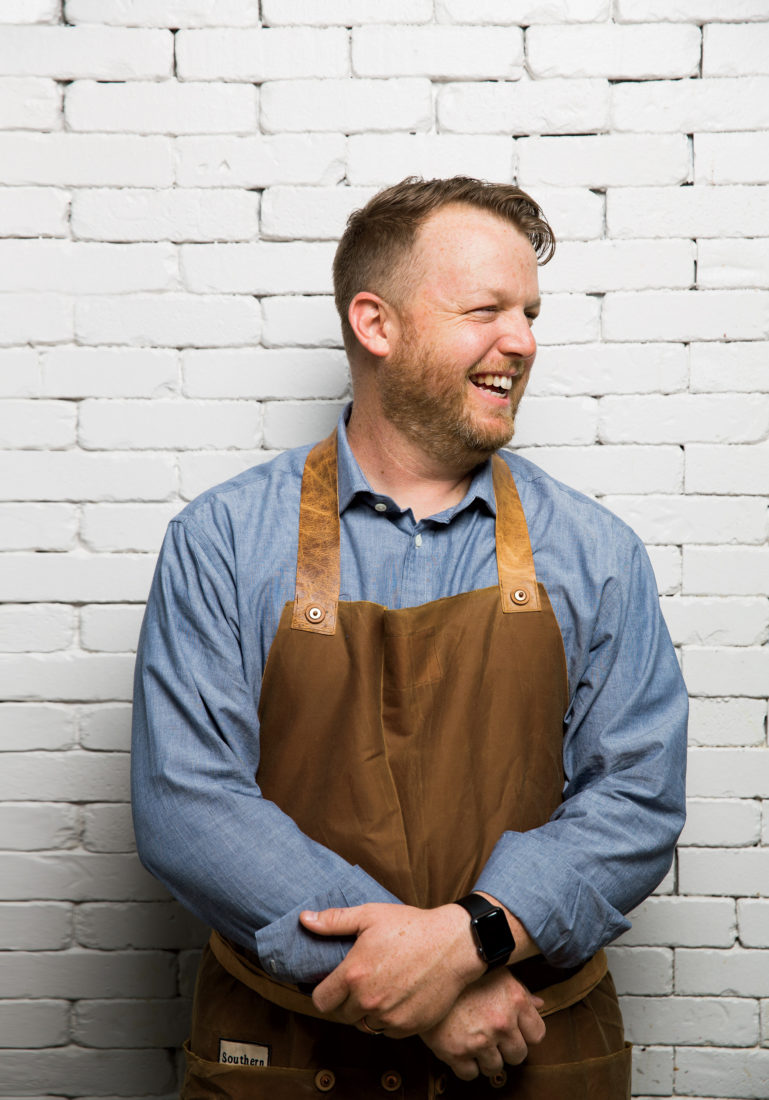
Photo: Luis Garcia
To meet demand, Karl Worley (pictured here, at Biscuit Love) and his wife, Sarah, plan to open a second location nearby in February.
Next time, as it turns out, is soon, as Biscuit Love’s second location (five miles from the first) is nearing the end of construction with an eye toward a February opening. Worley settles into a chair, and a plate of Bonuts arrives: thrice-rolled biscuit dough stuffed with lemon curd and whipped mascarpone filling, a dish he invented in honor of his wife’s birthday. He sips his cappuccino, peeking under the lid to make sure the barista bothered to add the latte leaf flourish even in a to-go cup (she has), and reveals that the second Biscuit Love outpost will occupy the very restaurant where he and Sarah shared their first date, a romantic detail that tickles him every time he thinks about it, given how far they have come from their modest start less than five years ago.
“On the day we launched the food truck in April 2012, we had thirty dollars left in our bank account and an eighteen-month-old baby,” Worley recalls. “I knew I had to sell sixty biscuits to break even.”
He began baking at five o’clock that morning in a borrowed commissary, stopping around noon to phone his wife in a biscuit panic.
“I was bawling my eyes out,” he says candidly. “I kept repeating, ‘I can’t do this. There is no way,’ but Sarah talked me off the ledge.”
By 5:00 p.m., an exhausted Worley had met his sixty-biscuit quota. He got home around 2:00 a.m., which allowed him three hours of sleep before getting up to start the process again.
“Food trucks are tough,” he allows, lifting his brow. “We worked twenty-one hours a day and earned eight hundred dollars in a good week. Those years taught us who we were.”
The grind also spawned a devoted following and national acclaim. Favorites emerged: the East Nasty, a boneless chicken thigh, sausage gravy, and aged cheddar wedged into a biscuit (Bon Appétit would name it the best sandwich of 2015), and the Princess, Worley’s take on the Nashville hot chicken craze. When that success allowed them to open the restaurant, the menu expanded, but most of the dishes still came with a signature biscuit inspired by his childhood.

Photo: Luis Garcia
Biscuit Love bakers stamp out between 1,400 and 1,500 biscuits each day.
Worley grew up in rural southern Appalachia, riding the bus to school an hour round the mountain with “all the other poor kids.” As a boy, he lived in a trailer with his parents and two older siblings (Kelly and Kerri) on his paternal grandfather Carl’s farm. “I was named after him, but my mom had this weird K thing,” Worley explains with a shrug.
A chef during World War II, the first Carl returned to Bristol, Tennessee, and opened an eponymous deli and convenience store on the main drag to South Holston Lake. Carl’s was the kind of local joint where neighbors would gossip as they bought cigarettes and plastic-wrapped sandwiches, bottles of Coke and cans of beer sweating on the counter, a bell chiming when the door swung open.
Karl’s mother worked at the deli, Karl tagging along, observing and absorbing what it meant to make people feel welcome; how the smallest kindness could bring light to a person accustomed to being overlooked by the world. On the farm, Karl would ride the tractor at his grandfather’s hip. He remembers watching harvests and hog killings, the elder Carl expertly butchering a pig the neighboring families would share. His grandfather was also known for his apple butter, which he made annually in a giant copper kettle, scraping it from the sides like sweet tar with an eight-foot wooden stir stick. One year it started raining and the pot was moved under a carport, where the heat of the coals and the concrete quickly conspired to make the batch explode.
“It shot coals through my overalls,” Worley says, laughing. “We strained the apple butter and used it anyway. Hashtag redneck childhood.”
When his grandfather died, the Worleys had to sell the farm. Soon after, his parents divorced, and his mother remarried. The new family of five moved their three-bedroom trailer to a nearby park. As soon as they could, Worley’s older siblings left to live in Blountville with their biological father, leaving young Karl behind with his mom and stepdad.
“I grew up alone,” he says flatly of his childhood from that point on, amid a lot of rage, he adds.
Worley found limited refuge in extended family, aunts and uncles who took him in on the odd weekend, cousins who laundered his clothes and brought him to church, where he was startled to see “a room full of people where no one was yelling.”
There was also his maternal grandmother, Minna.
“She lived alone in a cottage with coal heat, and I’d spend time with her whenever I could,” Worley remembers, his voice softening. “She was so gracious, loving. My grandmother was a reminder that the craziness I’d been living in wasn’t the only way.”
She also made biscuits.
“I’d sit at a little table and watch her cook. Drop biscuits for every day. And then on special occasions, she’d do yeast. I’ve never forgotten the taste.”
Photo: Luis Garcia
Here, Karl Worley grates butter into his standard dough. For the restaurant’s angel biscuits, he instead melts the butter before adding it to the other wet ingredients.
1 of 9
Photo: Luis Garcia
2 of 9
Photo: Luis Garcia
3 of 9
Photo: Luis Garcia
Dough gets combined by hand—no electric mixers.
4 of 9
Photo: Luis Garcia
5 of 9
Photo: Luis Garcia
6 of 9
Photo: Luis Garcia
Worley forms each biscuit a little differently, so it’s clear the rounds are handmade.
7 of 9
Photo: Luis Garcia
8 of 9
Photo: Luis Garcia
Using a deep pan lets them shape to the pan as they rise.
9 of 9
The magic in Worley’s food is not invention, but care. He makes everything 10 percent better than it needs to be, taking a dish already delicious and transforming it into something irresistible—via ingredient selection, or proportion, or sourcing, or a flavor tweak. He does this not because he is an accomplished chef (which he indisputably is), but because he is a man invested in making every experience you have as pleasing as it can possibly be.
“Food matters,” he clarifies. “But not as much as doing what you can for people.”
(To that end, every Biscuit Love employee earns a living wage. Even the dishwashers end up making at least fifteen dollars an hour. The full-time staff also has access to health insurance, free professional financial counseling, and guaranteed paid vacation.)
If you ask, Worley will eschew any claim to culinary finery. He is modest to the point of self-laceration. But he has a heart for his food, and for the people who trust him to cook it and who sit down to eat it. And that, frankly, is a quality far rarer and more valuable than simply being the next in a long line of cocksure chefs laying claim to the trend of the moment—an assessment his staff could not agree with more.
“It hit me the day Karl gave me a working interview on the truck,” recalls Lauren Garcia, who’s thirty-four, Biscuit Love’s second hire, and now a pastry chef. “When I finished, I called my mom and told her, ‘I don’t know why, but I think these people are going to be a really big part of my life.’” Garcia says she sensed even then “that Karl was special because of the way he treated people. You could feel the love in his food.”
Worley’s affection for cooking sparked in his early twenties, when he was employed as a CSX railroad conductor, living in an Atlanta apartment complex where he and his roommates prepared dinners for one another. Worley found genuine, unexpected joy serving others.
“I made dishes, and people really liked them,” he says. “It ignited dreams of opening a restaurant. But I never had the balls to jump off the cliff and do something about it.”
Not until 2011, what Worley dubs “the worst year ever.” He had married Sarah a couple of years before, and was working as a sales rep, peddling frozen goods for a supplier, pushing “everything I didn’t believe in.”
Then a friend of a friend offered Worley the free use of his food truck. “After some discussion about how best to capitalize on the gift, Sarah said, ‘I really like your biscuits.’ And that day changed my life forever.”
“The first year was really hard,” Sarah acknowledges of launching a business with no money and their toddler, Gertie, in tow. Learning the tangled ropes of Southern social culture also took the Pennsylvania native a minute. As did everything else.
“I couldn’t understand why every conversation had to last half an hour,” she says wryly of the early days. “But now that’s what I love about the South. It has its issues, but people take care of each other here. Karl,” she discloses with a hint of surprise, “has made me much softer.”
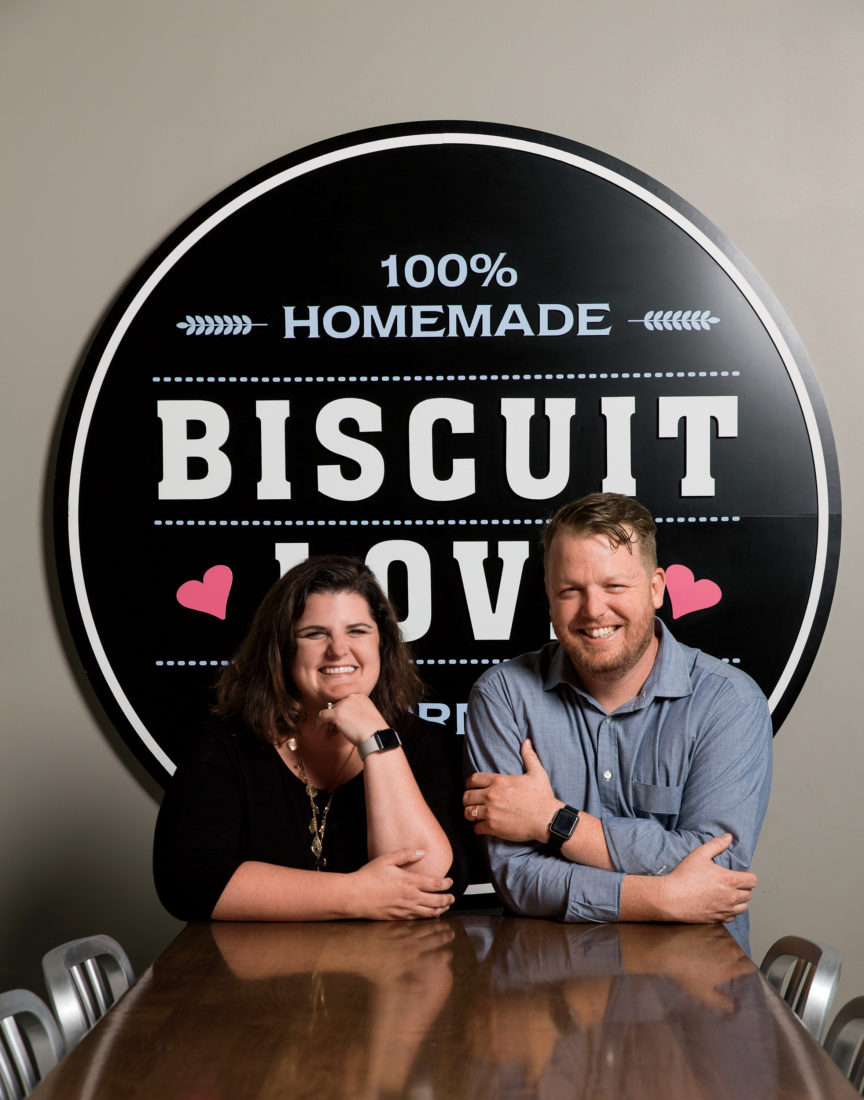
Photo: Luis Garcia
Worley’s wife, Sarah, suggested he hitch his wagon—or in this case, food truck—to biscuits.
Worley’s angel biscuits are based on those his grandmother made for Easter. He adjusted the recipe only slightly, using cake yeast for its complex flavor, and removing the lard for the vegetarians. He wanted his biscuits to be “just different enough,” knowing full well that, no matter how good they were, everybody would always believe “their grandmother’s biscuits were better.” He aimed for something distinctive that would stand alone. A goal he reached by carefully choosing his ingredients from select farms, using all winter wheat flour (which gives a softer texture) from Kentucky’s Weisenberger Mill, and keeping to his grandmother’s tradition of melting the butter on the stove and pouring it in with the wet ingredients.
Worley always combines his dough by hand and swears there will never be an electric mixer for biscuits in any of his locations. “Mixing and rolling them out is meditative for me,” he says. “It’s quiet, that same motion over and over. It’s the way I connect with the past.” The more he immersed himself in his cooking, Worley discovered, the easier it was to revisit his painful upbringing.
“It took a while, but I wanted to reconnect with my childhood in a healthy way,” he explains. “Something inside of me longed for that. To find the good parts. And build new memories of what should have been.”
Worley started by calling his mother and asking for their family recipes. Then he took what nourished him, and used it to nourish others.
“That’s what this is all really for,” he says. “I mean…”
Suddenly, he stops talking. His eyes mist. He swallows hard, looks away, apologizes.
“I had a shitty environment growing up,” he continues after a beat, wiping his cheeks with his palm.
“But every day I meet people who had it much worse than me. My food is going to be irrelevant someday. I’m going to be irrelevant someday. So the question is, how am I going to leave the world?”
The answer for Worley: fed.
“I want to feed people,” he says with something approaching pride. “I want to feed them what they need.”
It’s looking like rain as Worley drives his new Lexus to the dealership, having recently unloaded his old 1995 clunker. With the success of Biscuit Love, he’s finally upgraded and entered the world of “fancy car problems.”
He opts not to sit in the waiting room amid the blaring television and trays of stale pastry, instead taking a seat outside. As he plops down on a metal chair, watching luxury vehicles drive up, one after another, he reflects again on his upbringing. On what he lost. On what he is trying to regain.
“The first time someone paid me to cook them food that came out of my imagination was mind-blowing. Now we roll up to the restaurant and it’s ninety degrees and people are waiting forty-five minutes to eat my biscuits? Holy shit. I don’t ever want to get used to that feeling.”
He tells a story about visiting his hometown a few months ago with his daughter, Gertie, who is now six. How they drove to his grandfather’s old house and decided on a whim to knock on the door.
“We were invited in by the woman my grandfather wed right before he died,” Worley says, dropping his voice to confide, “He was a bit of a womanizer.
“Anyhow,” he goes on, “she still had my grandfather’s last jar of apple butter! She’d been displaying it in a lit curio cabinet.”
Worley laughs, shakes his head. He marvels at the humbling power of food, how it keeps memories alive, acts as the key that unlocks the history of our hearts. He believes, as deeply as he believes anything, that honest food can make us better people. And we lose touch with it at our peril.
The rain appears to be clearing. He decides he’ll drive downtown to the farmers’ market to stock up on tomatoes and corn for the Scenic City Supper Club event in Chatta-nooga, the type of high-profile chef gig he never imagined he’d be a part of. He’s flattered, but nervous. Foodieville is a far cry from Appalachia, where “we’d live on beans and cornbread for a month.”
I ask when he was happiest. Worley doesn’t hesitate.
“Saturday morning breakfasts as a child.”
He exhales deep and slow.
“It was the only time I could let my guard down. We cooked, and we sat, and we talked, and we nourished each other. It was some semblance of a normal family. It was a glimpse into a joyful life.”
Worley widens his eyes, breaks into an unabashed grin.
“It’s breakfast! How can you not be happy at breakfast?”




